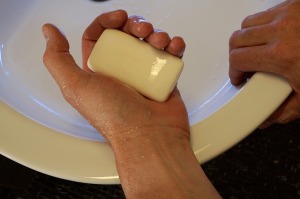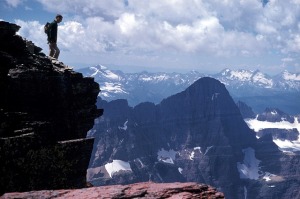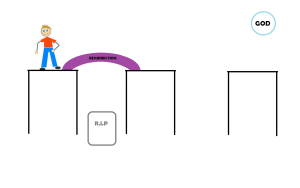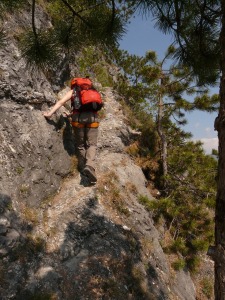 The journey back to our Father in Heaven is much like climbing a mountain. God is the perfect mountain climber. He knows how to conquer the mountain and lead us safely back home to Him. We are down on earth to become like our Father in Heaven (Matthew 5:48). When we are born we start at the bottom of the mountain and our goal is to learn to become like Him as we conquer and climb this mountain before us.
The journey back to our Father in Heaven is much like climbing a mountain. God is the perfect mountain climber. He knows how to conquer the mountain and lead us safely back home to Him. We are down on earth to become like our Father in Heaven (Matthew 5:48). When we are born we start at the bottom of the mountain and our goal is to learn to become like Him as we conquer and climb this mountain before us.
Our Heavenly Father has not left us alone in our journey up the mountain. He knew it would be difficult. He knew there would be obstacles, frustrations, sadness, and even pain. But he knew the vital, transformational life’s lessons we came down to earth to learn were to be best learned on the mountain – not in the meadow down below. Heavenly Father has given us mountain guides – prophets – who have traversed the mountain and conquered it. He had them write down their journey (we have a guide book!) and had them build sign posts to warn us of dangers.
God knew we wouldn’t learn how to be perfect mountain climbers in a day. He never expected us to race up the mountain in record time with a perfect score. He knew we’d mess up. He knew we wouldn’t be able to do it on our own. That is why He sent the Savior to atone for the mistakes we would make.
We are going to fall down as we climb – sometimes we’re going to skid half a mile down the mountain! It doesn’t matter how many times we fall. Heavenly Father is not keeping track of our failures! When we get to the top, He isn’t going to say, “Well, my daughter, you messed up 1,543,678 times. There’s no way I’m letting you in to heaven! Sally only messed up 876,393 times so I’m letting her in instead!”
Our challenge is not just to follow the rules and go through the motions of climbing up a mountain (and try to make the least mistakes we can!), but to BECOME a master climber and to help others on their way up the mountain. The final judgment won’t be a weighing of our good deeds on one side and our bad deeds on the other. I used to think that. I used to just hope I did more good than bad and that the scale would be heavier on the good side! No, the challenge of this life is not just to do good, but to BECOME good. Dallin H. Oaks put it best when he said:
“The Apostle Paul taught that the Lord’s teachings and teachers were given that we may all attain “the measure of the stature of the fulness of Christ” (Eph. 4:13). This process requires far more than acquiring knowledge. It is not even enough for us to be convinced of the gospel; we must act and think so that we are converted by it. In contrast to the institutions of the world, which teach us to know something, the gospel of Jesus Christ challenges us to become something.
Many Bible and modern scriptures speak of a final judgment at which all persons will be rewarded according to their deeds or works or the desires of their hearts. But other scriptures enlarge upon this by referring to our being judged by the condition we have achieved.
A parable illustrates this understanding. A wealthy father knew that if he were to bestow his wealth upon a child who had not yet developed the needed wisdom and stature, the inheritance would probably be wasted. The father said to his child:
“’All that I have I desire to give you—not only my wealth, but also my position and standing among men. That which I have I can easily give you, but that which I am you must obtain for yourself. You will qualify for your inheritance by learning what I have learned and by living as I have lived. I will give you the laws and principles by which I have acquired my wisdom and stature. Follow my example, mastering as I have mastered, and you will become as I am, and all that I have will be yours.’”
–Dallin H. Oaks, “The Challenge to Become,” General Conference October 2000
Heavenly Father doesn’t care how many times we fall down – He only cares about what we do after we mess up. Do we learn from it? Become better because of it? Make less mistakes in the future because of it?
We can’t change the fact that we fell down. That is in the past. The only question now is, “What are we going to do about it?” The only productive thing you can do from the past is learn from it. Once we learn from it (and fix anything we can) we need to move on. We can’t allow ourselves to dwell on past mistakes. That will ruin our future.
FAITH, HOPE, and CHARITY
Paul teaches us 3 key ingredients that are crucial to our success in climbing up the mountain: faith, hope, and charity.
The greatest act of charity ever performed on the earth was the Atonement of Jesus Christ. There was no greater, more unselfish, more loving act ever done. Satan did everything in his power to prevent Christ from following through with the Atonement, but he failed. The Atonement is real and available to all of God’s children. Satan knows that. He knows he can’t destroy the Atonement – so what does he do instead? He attacks our hope in the Atonement.
When we fall down, Satan whispers:
- “See? You fell again. You’ll never make it to the top. You’re not mountain climber material.”
- “You’re a failure.”
- “What’s the point of all this? You’re just going to fall again. Give up.”
- “Why don’t you just go play in the meadow down below? It will be more fun down there.”
- “Look at everyone way up there. They think you’re dumb. You’ll never be as good as they are.”
- “God will never forgive you now. You’ve fallen way too many times.”
Boyd K. Packer taught, “The discouraging idea that a mistake (or even a series of them) makes it everlastingly too late, does not come from the Lord.” (General Conference April 1989)
 Dieter F. Ucthdorf shares his experience of being an airline captain and a lesson it taught him about sin and the Atonement of Jesus Christ:
Dieter F. Ucthdorf shares his experience of being an airline captain and a lesson it taught him about sin and the Atonement of Jesus Christ:
During my training to become an airline captain, I had to learn how to navigate an airplane over long distances. Flights over huge oceans, crossing extensive deserts, and connecting continents need careful planning to ensure a safe arrival at the planned destination. Some of these nonstop flights can last up to 14 hours and cover almost 9,000 miles.
There is an important decision point during such long flights commonly known as the point of safe return. Up to this point the aircraft has enough fuel to turn around and return safely to the airport of departure. Having passed the point of safe return, the captain has lost this option and has to continue on. That is why this point is often referred to as the point of no return.
Satan, “the father of all lies…” uses the forces of evil to convince us that this concept applies whenever we have sinned….Satan wants us to think that when we have sinned we have gone past a “point of no return”—that it is too late to change our course.
Christ came to save us. If we have taken a wrong course, the Atonement of Jesus Christ can give us the assurance that sin is not a point of no return. A safe return is possible if we will follow God’s plan for our salvation.
–Dieter F. Uchtdorf, “Point of Safe Return,” General Conference April 2007
How Satan wants us to react after we have sinned is completely opposite of how the Lord wants us to react. Satan wants us to beat ourselves up, dwell on the past, and make us feel like a terrible, awful person who is damned and has no hope. God whispers encouragement to us. He whispers, “I love you. You can do this. You can change. I will help you.” He wants us to feel godly sorrow for the sin and repent, but He doesn’t want us to hate ourselves and lose hope. We need to be extremely careful about whose voice we are listening to after we have sinned. If we feel deep shame, want to give up, feel damned, despairing, and hated of God, that voice is not from God! It is from Satan!
“We need to remember that Satan seeks to discourage us and dissuade us from righteousness every chance he gets. Feelings of discouragement never come from God: they are always of the devil. President Brigham Young once remarked: ‘Serve God according to the best knowledge you have,…and when the Devil comes along and says, ‘You are not a very good Saint, you might enjoy greater blessings and more of the power of God, and have the vision of your mind opened, if you would live up to your privileges,’ tell him to leave; that you have long ago forsaken his ranks and enlisted in the army of Jesus, who is your captain, and that you want no more of the Devil’” (Discourses, 82) (Odds Are You’re Going to Be Exalted, Alonzo L. Gaskill, page 144)
On one occasion, the prophet Joseph Smith told Elder George A. Smith “Never be discouraged…If I were sunk in the lowest pit of Nova Scotia, with the Rocky Mountains piled on me, I would hang on, exercise faith, and keep up good courage, and I would come out on top.”
Nowhere, in all of scripture does God tell any one of His children that they have messed up too many times and that He doesn’t love them anymore. His message is the exact opposite!
- “Again, when I say unto the wicked, Thou shalt surely die; if he turn from his sin, and do that which is lawful and right….None of his sins that he hath committed shall be mentioned unto him: he hath done that which is lawful and right; he shall surely live.” (Ezekiel 33:14, 16)
- “Yea, as often as my people repent will I forgive them their trespasses against me.” (Mosiah 26:30) There is no limit to how many times God will forgive you!
- “And if he trespass against thee seven times in a day, and seven times in a day turn again to thee, saying, I repent; thou shalt forgive him.” (Luke 17:4) Look at Christ’s counsel to his disciples. Surely, he wouldn’t have a lower standard for Himself!
It is NEVER too late to repent. You have never sinned too much or too often that you are beyond Christ’s reach or His love.
“…however late you think you are, however many chances you think you have missed, however many mistakes you feel you have made or talents you think you don’t have, or however far from home and family and God you feel you have traveled, I testify that you have not traveled beyond the reach of divine love. It is not possible for you to sink lower than the infinite light of Christ’s Atonement shines.”
–Jeffrey R. Holland, “The Laborers in the Vineyard,” General Conference April 2012
Christ loves you. He is standing there, with open arms, waiting to help you. But sometimes we stubbornly refuse to reach up our hand. We sit, miserable and hurt, down in the dirt, with our arms folded across our chest and our head hung down. If we would only look up, we would see Him there with His hand stretched out to us, waiting for us to grab it. He won’t force us to stand up, but He will help us EVERY time ask.
Satan knows THE ONLY way to stop us from getting to the top of the mountain is for us to give up. But he can’t MAKE us give up. He can put obstacles in our way, whisper discouraging thoughts, and try to make the climb more miserable, but he cannot stop us. He doesn’t have the power. He can’t bind us with ropes or break our legs. All he can do is tempt us to give up.
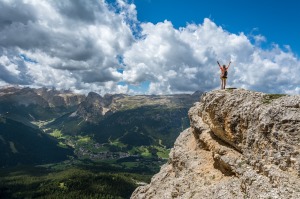 On the other hand, God will not force us to the top. We need to understand our own power. We are THE ONLY ones who can prevent ourselves from reaching the top of the mountain! We make the trip seem so complicated, but the key to success lies in ONE fact and it is SIMPLE: If we never give up, we will eventually reach the top of the mountain! Think about that. That is powerful. No matter how many times we fall, if get up each time and refuse to quit, we WILL conquer the mountain! It is guaranteed!
On the other hand, God will not force us to the top. We need to understand our own power. We are THE ONLY ones who can prevent ourselves from reaching the top of the mountain! We make the trip seem so complicated, but the key to success lies in ONE fact and it is SIMPLE: If we never give up, we will eventually reach the top of the mountain! Think about that. That is powerful. No matter how many times we fall, if get up each time and refuse to quit, we WILL conquer the mountain! It is guaranteed!
Elder Bruce R. McConkie explained: “Nobody becomes perfect in this life. . . . Becoming perfect in Christ is a process. We begin to keep the commandments today, and we keep more of them tomorrow. . . . We can become perfect in some minor things. . . .If we chart a course of becoming perfect, and, step by step and phase by phase, are perfecting our souls by overcoming the world, then it is absolutely guaranteed—there is no question whatever about it—we shall gain eternal life. . . . If we chart a course and follow it to the best of our ability in this life, then when we go out of this life we’ll continue in exactly that same course.
“All faithful Latter-day Saints – those who chart their course toward eternal life, receive the ordinances of salvation, and strive with all their hearts to be true to their covenants – will gain eternal life. Even though they are certainly not perfect when they die, if they have sought to stay on course, in covenant, in harmony with the mind and will of God, they will be saved in the highest heaven….We ought to have hope, [and] we [need] to be positive and optimistic about attaining that glory.”
–Elder Bruce R. McConkie, Odds Are You’re Going to Be Exalted, by Alonzo L. Gaskill, page 20
Sometimes we make life so complicated. We think the list of commandments is so long: we need to pray, study the scriptures, go to church, serve others, be honest, not swear, control our thoughts, etc. But it just boils down to this: those who will make it back to God are those who refused to give up. They are those who kept going no matter how hot it was, how tired they got, how impossible it seemed, or how many times they fell.
This life is not so much a test of how many commandments we can keep. It is a test of our determination and loyalty. Will we be loyal to the Savior no matter what storm or obstacle comes our way on the mountain? Will we utterly refuse to give up no matter how difficult the way?
D.H. Groberg wrote a poem that beautifully depicts the race of life, our role, and our Father’s encouraging role. Every time I feel discouraged, I re-read this poem and rekindle my hope.
The Race
attributed to Dr. D.H. “Dee” Groberg
Whenever I start to hang my head in front of failure’s face,
my downward fall is broken by the memory of a race.
A children’s race, young boys, young men; how I remember well,
excitement sure, but also fear, it wasn’t hard to tell.
They all lined up so full of hope, each thought to win that race
or tie for first, or if not that, at least take second place.
Their parents watched from off the side, each cheering for their son,
and each boy hoped to show his folks that he would be the one.The whistle blew and off they flew, like chariots of fire,
to win, to be the hero there, was each young boy’s desire.
One boy in particular, whose dad was in the crowd,
was running in the lead and thought “My dad will be so proud.”
But as he speeded down the field and crossed a shallow dip,
the little boy who thought he’d win, lost his step and slipped.
Trying hard to catch himself, his arms flew everyplace,
and midst the laughter of the crowd he fell flat on his face.
As he fell, his hope fell too; he couldn’t win it now.
Humiliated, he just wished to disappear somehow.But as he fell his dad stood up and showed his anxious face,
which to the boy so clearly said, “Get up and win that race!”
He quickly rose, no damage done, behind a bit that’s all,
and ran with all his mind and might to make up for his fall.
So anxious to restore himself, to catch up and to win,
his mind went faster than his legs. He slipped and fell again.
He wished that he had quit before with only one disgrace.
“I’m hopeless as a runner now, I shouldn’t try to race.”But through the laughing crowd he searched and found his father’s face
with a steady look that said again, “Get up and win that race!”
So he jumped up to try again, ten yards behind the last.
“If I’m to gain those yards,” he thought, “I’ve got to run real fast!”
Exceeding everything he had, he regained eight, then ten…
but trying hard to catch the lead, he slipped and fell again.
Defeat! He lay there silently. A tear dropped from his eye.
“There’s no sense running anymore! Three strikes I’m out! Why try?
I’ve lost, so what’s the use?” he thought. “I’ll live with my disgrace.”
But then he thought about his dad, who soon he’d have to face.“Get up,” an echo sounded low, “you haven’t lost at all,
for all you have to do to win is rise each time you fall.
Get up!” the echo urged him on, “Get up and take your place!
You were not meant for failure here! Get up and win that race!”
So, up he rose to run once more, refusing to forfeit,
and he resolved that win or lose, at least he wouldn’t quit.
So far behind the others now, the most he’d ever been,
still he gave it all he had and ran like he could win.
Three times he’d fallen stumbling, three times he rose again.
Too far behind to hope to win, he still ran to the end.They cheered another boy who crossed the line and won first place,
head high and proud and happy — no falling, no disgrace.
But, when the fallen youngster crossed the line, in last place,
the crowd gave him a greater cheer for finishing the race.
And even though he came in last with head bowed low, unproud,
you would have thought he’d won the race, to listen to the crowd.
And to his dad he sadly said, “I didn’t do so well.”
“To me, you won,” his father said. “You rose each time you fell.”And now when things seem dark and bleak and difficult to face,
the memory of that little boy helps me in my own race.
For all of life is like that race, with ups and downs and all.
And all you have to do to win is rise each time you fall.
And when depression and despair shout loudly in my face,
another voice within me says, “Get up and win that race!”


